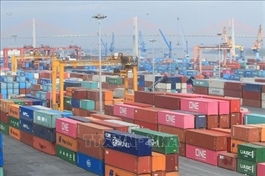MPI: Improving business environment key to recovery
MPI: Improving business environment key to recovery
Vietnam should focus on accelerating growth to ensure macroeconomy stability, controlling inflation, increasing production, and removing difficulties for businesses for the remainder of 2024.

This was the message contained in a supplemental report assessing the outcomes of last year's socioeconomic development plan and the situation following the first four months of 2024 by the Ministry of Planning and Investment (MPI).
The report has been approved by the National Assembly Economic Committee for submission to the assembly's seventh session of 2024 later this month. According to the MPI, the economy is forecast to continue to rebound this year.
The driving forces of investment are equity, foreign direct investment (FDI), public investment, state-owned enterprises, consumption, tourism, and exports.
"Macroeconomic stability and contained inflation, along with an improved investment and business environment, are the important fundaments that will spur development. International organisations continue to appreciate Vietnam’s achievements and growth prospects for 2024," said Deputy Minister of Planning and Investment Do Thanh Trung.
Vietnam is seen as a bright spot, together with Indonesia and Singapore, as the three markets make up a ‘golden startup triangle’ in ASEAN. Vietnam has also moved from 115 to 107 in the United Nations Development Programme's human-development index.
Trung noted that high-level foreign affairs and diplomatic activities continue to be implemented effectively, helping to elevate Vietnam’s status in the international arena and opening up multiple cooperative opportunities across the board.
Can Van Luc, BIDV chief economist, articulated the need for fiscal policy to further play a leading role this year.
"The Asian Development Bank and the World Bank agree that Vietnam has certain fiscal resources to support economic growth, such as continued extension of the 8 per cent VAT rate until the end of 2024 and the consideration of a reduction in car registration fees to stimulate domestic production and sales," said Luc.
Luc also suggested paying more attention to the interconnected risks between the stock and real estate market.
"The new Law on Credit Institutions helps overcome these risks, but it is necessary to monitor the practice, performing better management and supervision in the future," said Luc.



























